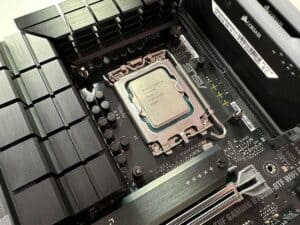Is 100°C too hot for a CPU?
Is 100°C too hot for a CPU? Let's find out

WePC is reader-supported. When you buy through links on our site, we may earn an affiliate commission. Prices subject to change. Learn more
CPU running at 100°C? That’s certainly concerning! In this article, we determine: is 100°C too hot for a CPU? We’ll also tell you why such a high temperature is a problem and share with you effective ways to lower CPU temperature.
Now Read: How to stress test CPU and RAM
Is a CPU temperature of 100°C too hot?
To tell you right off the bat – Yes. A CPU temperature of 100°C is too hot, even if you have a CPU that is particularly power-hungry or are recording this temperature while doing something extremely resource intensive on your system.
If you are experiencing temperatures of 100°C, then first of all, you probably have an Intel processor.
We can say that because if you had a Ryzen CPU, it would have shut down long before it ever heated up to 100°C.
Ryzen CPUs have a maximum operating temperature of 95°C, and some of the newer X3D variants have one of 89°C, which means it isn’t possible to hit a 100°C temperature on a Ryzen processor unless you tinker with thermal or power limits in your system’s BIOS.
Intel processors have a maximum operating temperature of 100°C, and some of the older ones have one of 105°C.
At a 100°C temperature, your processor is likely throttling its clock speeds pretty hard to remain active. It’s also very close to shutting down automatically to prevent long-term damage due to overheating.
A temperature of 100°C almost guarantees that there’s something wrong with your cooling solution. To put things into perspective, a normal CPU temperature under full load is 60 to 80°C.
How to cool your CPU: things to check
So, the first things you’ll want to check are:
CPU cooling fans
Your CPU cooler has its fan working properly. Also, check that the fan speed scales with temperature. In other words, the fan picks up speed as your CPU gets hotter.
CPU cooler mounting
Your CPU cooler is mounted properly. A cooler that isn’t mounted correctly won’t be making contact with the CPU’s IHS, resulting in virtually no cooling for the chip.
Thermal paste
You have the correct thermal paste application. Thermal paste is a grey liquid applied between the CPU IHS and cooler cold plate. It helps conduct heat between the two materials. Without thermal paste, heat transfer is much less efficient.
CPU cooler obstructions
There isn’t a layer of plastic film on your CPU cold plate. You can usually find one on coolers that come out of the box with thermal paste pre-applied. This plastic film is meant to be removed before the mounting of the cooler. Accidentally leaving it on can result in abnormally high temperatures.
TDP ratings
You also want to ensure that your CPU cooler is adequately rated for your processor. CPUs have a TDP (thermal design power) rating which indicates the maximum amount of heat they can generate.
CPU coolers also have a TDP rating, which represents the maximum amount of heat they’re intended to dissipate effectively. You want a CPU cooler with a TDP rating equivalent to or higher than that of your CPU.
If you have a CPU with a TDP of above 150 watts, it’s recommended to go with an AIO liquid cooler. Here’s more on liquid cooling vs air cooling.
Final Word
In conclusion, maintaining low CPU temperatures is vital for ensuring the health and longevity of your CPU. High temperatures can cause damage to the CPU’s internal components, reducing its lifespan and performance. Additionally, overheating can lead to system instability, crashes, and data loss.
By keeping your CPU temperatures as low as possible, you can ensure that your system runs smoothly, reliably, and efficiently over the long term. Therefore, it is crucial to monitor and control CPU temperatures using appropriate cooling solutions, such as air or liquid cooling, to prevent overheating and maintain optimal CPU health and longevity.





